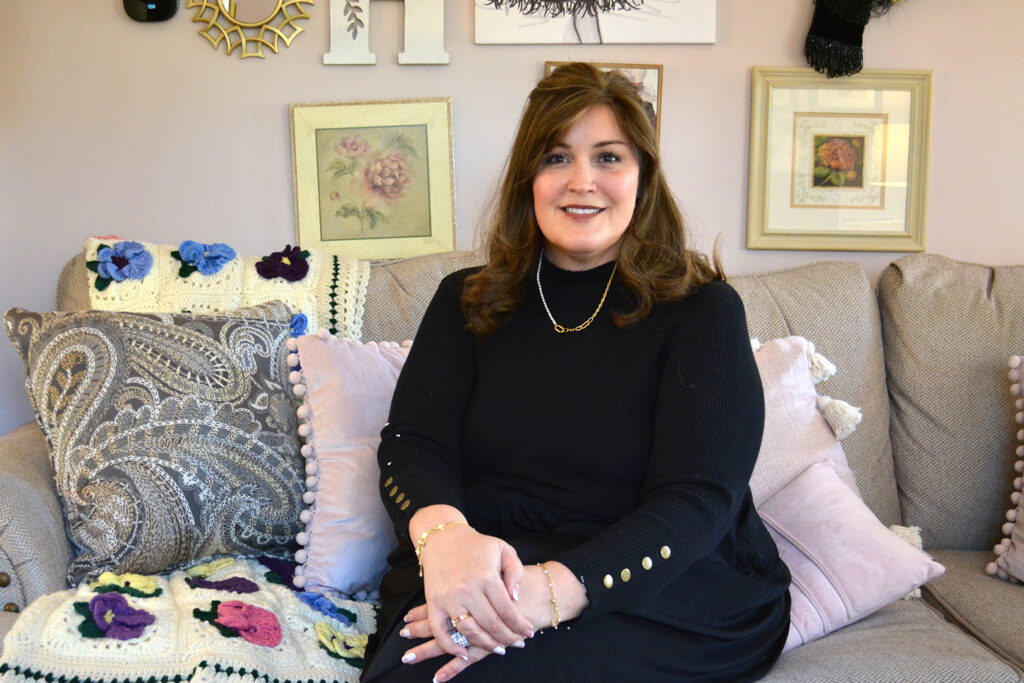
Jennifer Hyland has been married for 30 years to her high school sweetheart, Todd. Together, they have three beautiful daughters: Madison, who is called Peach; Olivia; and Caroline. Years ago, Peach was diagnosed with autism. It was life changing news, as it is for so many moms who find themselves in this position of being a special needs mom. It was devastating to learn of this diagnosis, but Jen was determined to do everything in her power to help her daughter.
The Hyland family was able to rise to this challenge, and today Peach is an adult who is thriving. Life as a special needs parent is not always easy, but it is beautiful and fulfilling. Jen is a testimony of hope for those who have encountered similar struggles.
I had the opportunity to interview Jen about her journey as a special needs mom. Our heart behind this interview is to help moms whose children are receiving a diagnosis, and as well as to educate people who may not know what it’s like to parent a special needs child. I hope you learn from this interview, and I hope that you are encouraged and inspired by Jen’s strength and resilience.
There’s so much involved. It’s important to keep an eye on her development, because what she has is a disordered development. This means that Peach developed, but she just didn’t develop typically. There could be things in her development that that haven’t come yet, even at 26 years old. I have to keep track of that kind of thing.
I also keep track of any physical problems with her, because she won’t tell me [about them]. [For example,] she might not tell me if she has a toothache, because she might be afraid to tell me that. I have to really be an expert on looking for signs and symptoms.
Planning for her future as she was growing up [was also important]. I would plan her academics, her education, and her enrichment activities. Right now, I am planning for her future and what that’s going to look like when Todd and I are no longer here.
They’ve changed. I can’t say they’ve gotten easier, but they’ve changed. My responsibility when she was young was figuring out what the breadth of her disability was, and then setting up different resources for her to make sure that she could get the best education and the best extracurricular activities that she could.
Now, as she gets older, that all changes to learning what’s developmentally appropriate for a 26-year-old woman. I look for things that make her feel fulfilled in her life. That involves looking at jobs for her and [watching over] her relationships with others, including her boyfriend.
[Over the years], the focus has changed. Now she’s off my insurance, and that’s a whole new change that we’re dealing with this year. I’m never coasting. It’s always changing into something different.
One challenge that I that I faced with the kids growing up is that I had three girls. They were pretty close in age, and [I wanted to ensure that I was] being fair between the three of them. [I often felt] like I was giving one too much attention. What I came to notice is that all three of my girls are just so completely different. At any time, one of them might be my main focus.
Sometimes we would go to Target, and I knew that I wasn’t going to get out of there unless I bought Peach something. The other two girls weren’t going to get something. I would worry whether they were going to think that was unfair. Are they going to grow up and think, “My mom was always spending time with Peach, or she was always getting her extra things”? Thank God, I was blessed with two wonderful daughters who saw that they might not have gotten the extra toy at Target, but they both got to go on a senior trip. They both got to get a car, and Peach didn’t get to have those things.
I think all mothers have to worry about dividing themselves between their children, and also about communication. I’m totally a person who communicates – probably overcommunicates – and having a child with a disability where she doesn’t sometimes communicate things to me [is a challenge]. I find myself worrying about whether I’m understanding what’s going on with her. I try to make sure that I’m giving her all I can possibly give her, because I don’t want to miss out on anything.
People would say to me all the time, “You are doing so good! You and Todd do so much for Peach.” But I always feel like there can be more. I’m afraid that I’m missing something. My other girls, as they got older, they made their lives for themselves. I am responsible of making all of Peach’s experiences for her, so I want to make sure I’m giving her what she needs.
Peach was diagnosed with autism at two years, three months. Of course, we were reeling back then. We just had just had Olivia. Olivia was just five months old when Peach was diagnosed. So I had this one child who was diagnosed with a lifelong disability, [and now I’m worrying whether I’m going to give the second one the same thing].
It was so nerve-wracking back then. I kind of closed up in my house, and I didn’t want anybody talking to me. Somebody sent me a letter that said, “If God looked down at all women past, present, and future, and he said to you, ‘I have this child up here, and she is not going to sleep through the night until she’s six years old. She’s not going to be potty trained until she’s six years old. She’s going to have food aversions.’ But God looked at you and said, ‘You are the perfect mommy for this angel. Would you take care of her?’ What would you say?”
I responded, “I would never say no.” And in that moment, it became an honor. It was not a burden, it was not something bad, it was not a disease. It was simply Peach, and this is how God gave her to me.
That made me see everything differently going forward. Other people would say to me, “How are you not devastated by this?” And I said, “Because God gave her to me just like this. She’s a masterpiece handmade by God. I would have her no other way.”
If somebody gave me a pill tomorrow that would make her not what she is, I would say, “No, thank you.” How do we know what is Peach and what is autism? To me it’s not a disease that she has, it’s a way that she is. And I love it.
It has made me grateful for every milestone that my other two kids have met. I don’t take anything for granted. Peach didn’t say, “No,” until she was five years old. When I point to something and my grandson, Graham, looks at it, I breathe a sigh of relief. That’s called following the line of regard, and that is a sign of appropriate development. We celebrated every developmental milestone with Peach, but also with my other girls. I did not take it for granted.
When I look at Peach and her special needs, I think about other things that parents are going through with children that don’t have special needs. All children have challenges. We have challenges with all of our children, but Peach is tough at times. People at church only get to see the best of her. They get to see the smiling, flamboyant, bouncing around girl. But we have some really tough times, too.
I’ll give this advice to all moms, which is do compare. So many people say don’t compare children. But you need to compare, because you need to assess. With Peach, I would say to my friends, “She’s not doing this, and she’s not doing that.” They’d be like, “Oh, please, it’s no big deal. My child didn’t do this or my child didn’t do that.” But when I put all those things together, she had too many red flags. It was a good thing that I did compare, because I noticed that there was something atypical.
Compare your child to others for the sake of assessing, and then once you see that that’s okay, then you can move on. I’m glad I did compare, or else I wouldn’t have caught it that early. The earlier you catch it, the earlier you can get the services that you need.
My other advice is this: don’t be afraid of a diagnosis. So many people are so afraid of having their child labeled or diagnosed, but that is how you get the services that you need. [Without the diagnosis,] then you don’t get what you need to help them. It’s really hard, because as mothers, all we want to do is talk about how wonderful our children are. It could hurt sometimes, but we have to look at what’s wrong so that we can get them the help that they need.
[My last piece of advice is to] get involved in a support group. I can remember my mom telling me to do it, and I didn’t want to go. But I went to a support group, and I sat there listening to women talk about how their child was eating coins, or eating a box of tissues.
I remember sitting in that meeting thinking, “This isn’t me. I should be a ballet mom; I shouldn’t be the mom sitting here listening to people say their kids are eating quarters.” But I kept on going, and a couple of months later I was running the group. I ended up running that group for years, because there is comfort in being with people who are going through something similar. Moms are the best advocates, and [they are often] how you find out all of the information [about how to help your child].
I could not have done this without my walk with the Lord. Although I say that I would have her no other way, it was a hard thing to be told that my child was going to have a lifelong disability. That was overwhelming and so upsetting. When this happens to families, it either breaks a marriage and a family apart, or it brings them so close together. Thank God, my story is that it brought Todd and I so close together.
With each one of our other children, it was like God had this perfect puzzle with all of the pieces. He chose Caroline, he chose Olivia, he chose all of us to be this family unit together with Peach. We depend on him for everything. I have seen so many miracles through her life and through the special services she’s gotten. [Being a special needs parent is one of my mission fields.] People will say, “How can you act happy and optimistic? Is it because she’s high functioning?” No, it’s not. It’s because I know the Lord, and I know that he gave her to me on purpose. I don’t consider this a burden or a cross to bear.
Even Peach was a little testimony when she was in preschool. While they were swinging her on the swing, she was singing, “I’ve got peace like a river.” All of the ladies, they didn’t even know the song, but they ended up singing along.
If you live in New Jersey, here are some autism resources that you may find helpful.

